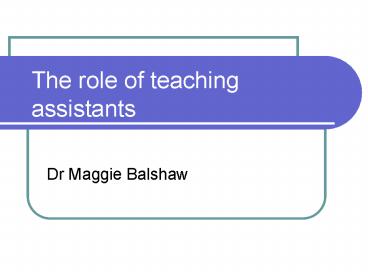The role of teaching assistants - PowerPoint PPT Presentation
1 / 13
Title:
The role of teaching assistants
Description:
Line management, support and mentoring of LSAs. Role. Effective classroom practice ... needs of teachers in developing classroom management skills with respect to TAs ... – PowerPoint PPT presentation
Number of Views:7622
Avg rating:5.0/5.0
Title: The role of teaching assistants
1
The role of teaching assistants
- Dr Maggie Balshaw
2
Aims of the seminar
- To address these questions
- What do we mean by teaching assistants?
- How has their role developed?
- What has research told us?
- What does effective practice look like?
- How can we develop effective practice?
3
Whats in a name?
- 1970s Welfare Assistant
- 1980s Special Needs Assistant
- Special Support Assistant
- 1990s Learning Support Assistant
- 2000s Teaching Assistant
4
National research into the work of Learning
Support Assistants 1998 -1999
- Management
- Contracts, job descriptions and pay
- Line management, support and mentoring of LSAs
- Role
- Effective classroom practice
- Teamwork with teachers
- Training
- Availability and future plans nationally
- Quality, content, relevance and impact on
practice - Farrell, P., Balshaw, M.H. and Polat, F. (1999)
- The management, role and training of learning
support assistants DfEE Publications
5
Definition of Effective Practice
- Effective practice in relation to TAs and Support
Staff involves contributions that - Foster the participation of pupils in the social
and academic processes of the school - Seek to enable pupils to become more independent
learners - Help to raise standards of learning for pupils
- DfES Good Practice Guide 2000
6
Effective deployment strategies
- Successful deployment of TAs and Support Staff is
based on the following strands - Support for pupils
- Support for teachers
- Support for the curriculum
- Support for the school
- DfES Good Practice Guide 2000
7
TA role in the classroom
- Summary of key issues
- Reducing barriers
- To co-operative learning with and from peers
- To direct teacher attention for all pupils
- To overall classroom processes and activities
- Encouraging independent learning
- Creating opportunities for individual and
co-operative learning without direct adult
support - Developing confidence in standing back so pupils
take risks
8
TA role in the classroom
- Summary of key issues
- Maximising potential of additional resource
- Creating opportunities for TAs and Support Staff
to use skills and expertise to support the
overall curriculum - Using these with many of the pupils, not just a
few - Planning co-operatively
- Using opportunities for planning together
- Seeking formalised time for this
- Using TA and Support Staffs views and skills to
review classroom processes and outcomes in order
to aid planning
9
Staff development and training
- Summary of key issues
- Developing skills in learning in classroom
partnerships - Two-way feedback about classroom activities
- Questioning how and why plans and outcomes worked
or not - Learning from the joint experiences
- Learning lessons from pupil feedback
- Building on joint classroom experiences and
sharing these with other colleagues
10
Staff development and training
- Summary of key issues
- Staff development opportunities
- Building on joint classroom experiences and
sharing these with other colleagues - Staff development programmes which support this
- An inclusion of TAs and Support Staff in staff
development planning - Attention to the needs of teachers in developing
classroom management skills with respect to TAs
and Support Staff
11
Staff Development and Training
- Summary of key issues
- Wider staff development and training needs
- Opportunities for TAs and Support Staff to
identify and pursue relevant training, and where
available, gain qualification - Develop a professional development portfolio to
support Continuous Professional Development - Attention to the need to recognise the
achievements and experience of TAs and Support
Staff in a career structure (based on the
National Occupational Standards framework)
12
Management
- Summary of key issues
- Drawing up and reviewing job descriptions with
TAs and Support Staff (using the Good Practice
Guide to support this process) - Ensuring that teachers, TAs and Support Staff get
time to plan together, in contracted time - Attention paid to induction, mentoring and
appraisal (or performance management) processes
(and the use of a professional development
portfolio)
13
Management
- Summary of key issues
- Contracts which reflect a continuous role
supporting the curriculum, rather than
individuals - (Recognition of the role that TAs and Support
Staff can play in the remodelling agenda for
support staff, being aware through the above
processes of their competence and confidence) - Issuing contracts which reflect TAs and Support
Staffs skills, experience and qualification,
thus fostering a career structure































